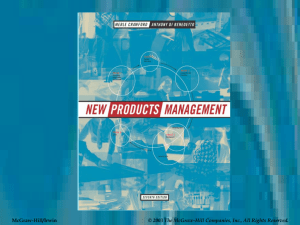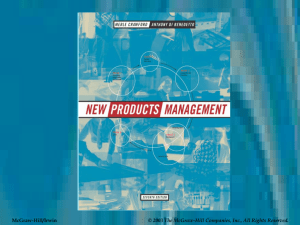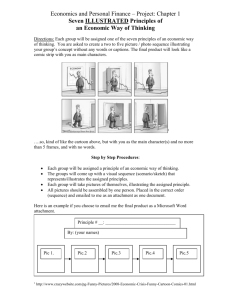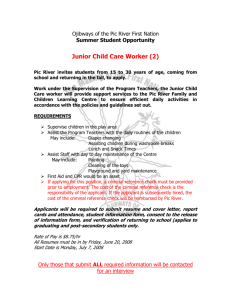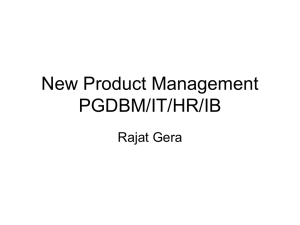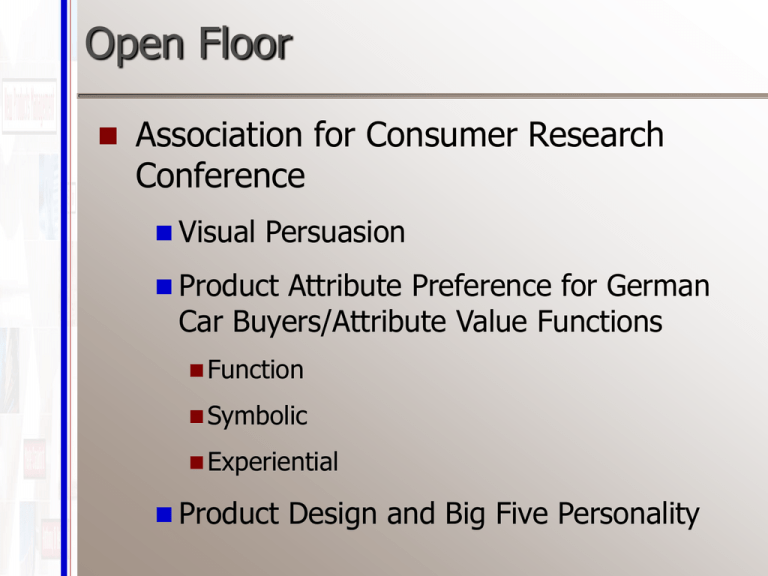
Open Floor
Association for Consumer Research
Conference
Visual Persuasion
Product Attribute Preference for German
Car Buyers/Attribute Value Functions
Function
Symbolic
Experiential
Product Design and Big Five Personality
Open Floor
Association for Consumer Research
Conference
(Continued)
Persuasive Appeals for Aesthetic Product
Consumption
Product Personalization (Mass Customization)
Counterfeit Goods
Psychology of Category Design
Pretty and Ugly
Brand Experience Scale
Open Floor
Joe Cote Support Letter
Pressing managerial need for assessing
technologies/products
The NPD Literature gap in the
commercialization of existing technology
Commercialization of existing technology
literature is publishable
Open Floor
Groups for BA 590 Project
If You Want to Switch…
Get OK from BOTH (all?) Groups
Let Me Know
Finalize by Next Class
Open Floor
Today…
Q and A for “Marketing Review” Slides
Lecture/Discussion
Project Overviews
2-3 Minute Presentation
Class Feedback
Review/Preview
Q and A Marketing Review
Helpful/Not Helpful?
Specific Questions…
Any Additional Info needed?
PART ONE
OVERVIEW AND OPPORTUNITY
IDENTIFICATION/SELECTION
McGraw-Hill/Irwin
Copyright ©2006 The McGraw-Hill Companies, Inc. All right reserved.
Opportunity Identification and
Selection
Figure I.1
CHAPTER 1
THE MENU
McGraw-Hill/Irwin
Copyright ©2006 The McGraw-Hill Companies, Inc. All right reserved.
Some Hot New Products
Kawasaki Z1000 – a “naked” sport bike with a minimal plastic
body designed to show off the inner workings.
Figure 1.1
Trivection ovens – GE’s Profile and Monogram ovens use a
combination of thermal, convection, and microwave technology.
PalmOne Treo 6000 – A handheld PDA with phone, speakerphone,
camera, music player, and keyboard.
Clorox Bleach Pen – A gel pen that lets you put bleach where you
want to, such as on mildew between shower tiles.
Apple’s iTunes Music Store – Allows you to download hundreds of
thousands of songs from the Internet to save or play on an Apple
iPod.
P&G’s Mr. Clean Magic Eraser – Melamine scouring pad with an
eraser-like function: it wears down with use.
Toyota Prius – Hybrid car with futuristic styling and 55 MPG gas
mileage.
Products of the Future
Figure 1.2
Intelligent refrigerators will track food inventories, and will either provide a
hard-copy shopping list or send an electronic list to a home-delivery
service.
Intelligent wallpaper will transform a wall to a television, a computer
screen, works of art, etc.
Robotic lawn mowers will tend the grass within any specified boundary.
“Nanny-cams” hidden in teddy bears permit parents to watch their children
at daycare; camera-surveillance systems will keep an eye on latchkey kids
home alone.
Holographic storage will be used to store and retrieve home videos.
Lasers and decay-preventive gum and toothpastes will minimize the need
for the dentist’s drill.
Robots will dispense gasoline, and know your preferred grade.
“Smart” heart pacemakers will be placed in the wrist.
Source: Marian Salzman and Ira Matathia, “Lifestyles of the Next Millennium: 65 Forecasts,” The Futurist, July-August 1998.
Not All New Products Are Planned
Microwave ovens
Aspartame (NutraSweet)
ScotchGard fabric protector
Teflon
Penicillin
X-rays
Dynamite
Figure 1.3
In each case, an accidental discovery -- but someone knew
they had something when they saw it!
What Is a New Product?
Figure 1.4
New-to-the-world (really-new) products (10% of new products):
Inventions that create a whole new market. Ex.: Polaroid camera,
Sony Walkman, Palm Pilot, Rollerblade skates, P&G Febreze and Dryel.
New-to-the-firm products (20%): Products that take a firm into a
category new to it. Ex.: P&G brand shampoo or coffee, Hallmark gift
items, AT&T Universal credit card, Canon laser printer.
Additions to existing product lines (26%): Line extensions and flankers
in current markets. Ex.: Tide Liquid, Bud Light, Apple’s iMac, HP
LaserJet 7P.
Improvements and revisions to existing products (26%): Current
products made better. Ex.: P&G’s continuing improvements to Tide
detergent, Ivory soap.
Repositionings (7%): Products that are retargeted for a new use or
application. Ex.: Arm & Hammer baking soda sold as a refrigerator
deodorant; aspirin repositioned as a safeguard against heart attacks.
Cost reductions (11%): New products that provide the customer
similar performance but at a lower cost. May be more of a “new
product” in terms of design or production.
What About…
New Services?
New Business-to-Business Products?
New International/Global Products?
What Is a Successful New Product?
Percent of Products that Fail
90
90
80
70
60
50
40
30
20
10
0
40
10
Sometimes Quoted
in Press
Research Reports
Sometimes Claimed
Although you may hear much higher percentages, careful
studies supported by research evidence suggest that about
40% of new products fail -- somewhat higher for consumer
products, somewhat lower for business-to-business products.
Classic Brand Names
Budweiser
Ivory
Coca-Cola
Maxwell House
Kodak
General Electric
Steinway
Wrigley
Kleenex
Waterford
L.L. Bean
Ford
John Deere
Maytag
JCPenney
Sears
Colgate
Hershey
Gillette
Ticonderoga
Which of these have the most value today as launch pads
for new products?
The Conflicting Masters of New
Products Management
Figure 1.6
Three inputs to the new
products process: the right
quality product, at the right
time, and at the right cost.
These conflict with each
other but may have
synergies too.
Issue: how to optimize
Time
these relationships in a
new product situation.
Quality
Value
Cost
Breakthrough Innovations that
Changed Our Lives
Figure 1.7
Personal Computer
Microwave Oven
Photocopier
Pocket Calculator
Fax Machine
Birth Control Pill
Home VCR
Communication satellite
Bar coding
Integrated Circuit
Automatic Teller
Answering Machine
Velcro Fastener
Touch-Tone Telephone
Laser Surgery
Apollo Lunar Spacecraft
Computer Disk Drive
Organ Transplanting
Fiber-Optic Systems
Disposable Diaper
MS-DOS
Magnetic Resonance
Imaging
This list was compiled in the early 1990s. Since then one would
certainly have to add the Internet/World Wide Web.
Anything else you would add? Which would you delete?
CHAPTER 2
THE NEW PRODUCTS PROCESS
McGraw-Hill/Irwin
Copyright ©2006 The McGraw-Hill Companies, Inc. All right reserved.
The Basic New Product Process
Phase 1: Opportunity Identification/Selection
Phase 2: Concept Generation
Phase 3: Concept/Project Evaluation
Phase 4: Development
Phase 5: Launch
The Evaluation Tasks in the New
Products Process
Opportunity Identification/
Selection
Direction;
Where should we look?
Concept Generation
Initial Review:
Is the idea worth screening?
Concept/Project Evaluation
Full Screen:
Should we try to develop it?
Development
Progress Reports:
Have we developed it?
Launch
Market Testing:
Should we market it?
Phase 1: Opportunity
Identification/Selection
Active and passive generation of new product
opportunities as spinouts of the ongoing
business operation. New product suggestions,
changes in marketing plan, resource changes,
and new needs/wants in the marketplace.
Research, evaluate, validate, and rank them (as
opportunities, not specific product concepts).
Give major ones a preliminary strategic
statement to guide further work on it.
Activities that Feed Strategic
Planning for New Products
Ongoing marketing planning (e.g., need
to meet new aggressive competitor)
Ongoing corporate planning (e.g., senior
management shifts technical resources
from basic research to applied product
development)
Special opportunity analysis (e.g., a firm
has been overlooking a skill in
manufacturing process engineering)
Sources of Identified Opportunities
An underutilized resource (a manufacturing
process, an operation, a strong franchise)
A new resource (discovery of a new
material with many potential uses)
An external mandate (stagnant market
combined with competitive threat)
An internal mandate (new products used
to close long-term sales gap, senior
management desires)
Phase 2: Concept Generation
Select a high potential/urgency opportunity,
and begin customer involvement. Collect
available new product concepts that fit the
opportunity and generate new ones as well.
Phase 3: Concept/Project
Evaluation
Evaluate new product concepts (as they begin to
come in) on technical, marketing, and financial
criteria. Rank them and select the best two or
three. Request project proposal authorization
when have product definition, team, budget,
skeleton of development plan, and final PIC.
Stages of Concept/Project
Evaluation
Screening (pre-technical evaluation)
Concept testing
Full screen
Project evaluation (begin preparing
product protocol)
The first stages of the new products process are sometimes
called the fuzzy front end because the product concept is
still fuzzy. By the end of the project, most of the fuzz
should be removed.
Phase 4: Development (Technical
Tasks)
Specify the full development process, and its
deliverables. Undertake to design prototypes,
test and validate prototypes against protocol,
design and validate production process for the
best prototype, slowly scale up production as
necessary for product and market testing.
Phase 4: Development (Marketing
Tasks)
Prepare strategy, tactics, and launch details
for marketing plan, prepare proposed business
plan and get approval for it, stipulate product
augmentation (service, packaging, branding,
etc.) and prepare for it.
Phase 5: Launch
Commercialize the plans and prototypes from
development phase, begin distribution and sale
of the new product (maybe on a limited basis)
and manage the launch program to achieve
the goals and objectives set in the PIC (as
modified in the final business plan).
The Life Cycle of a Concept
Figure 2.3
Corresponding New Products Process Phases:
Opportunity Identification Concept Generation Project Eval. Development Launch
Techniques for Attaining Speed in a
New Product Project
Accelerating Product Development through
Managing the Organization
Use projectization: project matrix and venture
teams.
Use small groups to thwart bureaucracy.
Empower, motivate, and protect the team.
Destroy turf and territory.
Make sure supporting departments are ready.
Clear the tracks in shared departments.
Techniques for Attaining Speed
(continued)
Intensify Resource Commitments
Integrate channel members and customers, use
parallel or concurrent engineering
Design for Speed
Computer-aided design, rapid prototyping, designaided manufacturing, common components
Prepare for Rapid Manufacturing
Simplified documentation and process planning,
just-in-time delivery (flexible manufacturing)
Prepare for Rapid Marketing
Use rollouts, invest in immediate market awareness,
facilitate trial purchasing
Key Characteristics of Short-CycleTime Firms
Extensive user involvement early in the
new products process.
Cross-functional teams are dedicated to
the new product.
Suppliers are extensively involved.
The firms adopt effective design
philosophies and practices.
The most adept firms are effective at
organizational learning.
What About New Services?
Successful new services tend to come from
firms that use a systematic process much like
the new products process – the tools all fit.
Iterations may be more frequent since they are
less expensive.
Unique, superior service, providing value and
benefit as perceived by the customer, must be
delivered, to achieve success.
Speed to market with services is important,
especially in enhancing reputation, image, and
customer loyalty.
What About New-to-the-World
Products?
The challenges are different, but the first phase
remains the same: opportunity identification and
development of a strategic statement.
Clear connection required between the radical
innovation and the firm’s strategic vision.
The new products process is more explanatory:
need to bring in Voice of the Customer (VOC)
early.
Lead users may be critical here (see Chapter 5
discussion).
The Probe-and-Learn Process for Newto-the-World Products
Focused (limited-performance) prototypes
Example: Iomega Zip Drive: over 50 prototypes
were built to test out ideas with customers.
“Lickety-Stick” iterative process: non-linear,
more flexible process in which dozens of
prototypes may be tried (“lickety”) before
settling on one that customers like (“stick”).
BA 590
Break
CHAPTER 3
OPPORTUNITY IDENTIFICATION
AND SELECTION:
STRATEGIC PLANNING
FOR NEW PRODUCTS
McGraw-Hill/Irwin
Copyright ©2006 The McGraw-Hill Companies, Inc. All right reserved.
Why Does a Firm Need a New
Products Strategy?
To chart the group’s/team’s direction
To set the group’s goals and objectives
What technologies?/what markets?
Why does it exist?
To tell the group how it will play the game
What are the rules?/constraints?
Any other key information to consider?
Corporate Strengths
New products in this firm will:
Use our fine furniture designers (Herman Miller)
Gain value by being bottled in our bottling system
(Coca-Cola)
Utilize innovative design (Braun)
Be for babies and only babies (Gerber)
Be for all sports, not just shoes (Nike)
Be for all people in computers (IBM)
Proliferate our product lines (Rubbermaid)
Be almost impossible to create (Polaroid)
Use only internal R&D (Bausch & Lomb)
Product Platform Planning
Many firms find that it is not efficient to develop
a single product.
Platform: product families that share similarities
in design, development, or production process.
Car industry: $3 billion price tag on a new car
platform is spread out over several models.
Sony: four platforms for Walkman launched 160
product variations.
Boeing: passenger, cargo, short- and long-haul planes
made from same platform.
Black & Decker: uses a single electric motor for
dozens of consumer power tools.
Opportunity Identification: Greenfield
Markets
Find another location or venue: Once McDonald’s had taken
up the best locations for traditional fast-food restaurants, it
continued its U.S. expansion by placing stores inside Wal-Marts,
in sports arenas, and elsewhere. Starbucks Coffee complemented
coffee-shop sales by selling its coffee beans and ice creams in
supermarkets.
Leverage your firm’s strengths in a new activity center:
Nike has recently moved into golf and hockey, and Honeywell is
looking into casino opportunities.
Identify a fast-growing need, and adapt your products to
it: Hewlett-Packard followed the need for “total information
solutions” that led it to develop computing and communications
products for the World Cup and other sporting events.
Find a “new to you” industry: P&G in pharmaceuticals, GE in
broadcasting (NBC), Disney in cruises, Rubbermaid in gardening
products – either through alliance, acquisition, or internal
development.
Source: Allan J. Magrath, “Envisioning Greenfield Markets,” Across the Board, May 1998, pp. 26-30.
What is the Product Innovation
Charter (PIC)?
It is the new product team’s strategy.
It is for Products (not processes).
It is for Innovation (think of the definition
of new product).
It is a Charter (a document specifying the
conditions under which a firm will
operate).
The Contents of a Product Innovation
Charter
Background
Key ideas from the situation analysis; special forces such as managerial dicta; reasons for
preparing a new PIC at this time.
Focus
At least one clear technology dimension and one clear market dimension. They match and
have good potential.
Goals-Objectives
What the project will accomplish, either short-term as objectives or longer-term as goals.
Evaluation measurements.
Guidelines
Any "rules of the road," requirements imposed by the situation or by upper management.
Innovativeness, order of market entry, time/quality/cost, miscellaneous.
A Sample PIC for a Chemical Product
Focus: The XYZ Company is committed to a program of
innovation in specialty chemicals, as used in the automobile
and other metal finishing businesses, to the extent that we will
become the market share leader in that market and will
achieve at least 35 percent ROI from that program on a threeyear payout basis. We seek recognition as the most technically
competent company in metal finishing.
Goals-Objectives: These goals will be achieved by building
on our current R&D skills and by embellishing them as
necessary so as to produce new items that are demonstrably
superior technically, in-house, and have only emergency
reliance on outside sources. The company is willing to invest
funds, as necessary, to achieve these technical breakthroughs.
Guidelines: Care will be taken to establish patent-protected
positions in these new developments and to increase the safety
of customer and company personnel.
PIC Special Guidelines
Degree of Innovativeness
Timing
First-to-market
Adaptive product
Imitation (emulation)
First
Quick second
Slow
Late
Miscellaneous
Avoidance of competition with certain firms
Recognition of weaknesses
Patentability
Product Integrity
Tips for PIC Development
Note where you are starting -- what decisions
have already been made?
Watch for any and all opportunities.
Confirm interesting opportunities.
Keep balance between focus and freedom -wildcatting can pay off too.
Speed usually assumed a well-established,
close-to-home PIC.
PICs less useful in cases where personal tastes
rule (art, games, foods) or where the biggest
task is developing a new technology (wait till
you have it).
More Tips
Poor implementation will still ruin a good PIC
(e.g., Bic perfume in lighter fluid package).
Watch for PIC conflicts -- e.g., a “flood the
market” line extension strategy may hurt real
innovation. Some charters dictate separate
organizations.
Once in place, live by it. Use at all stages -organization, concept generation, concept
evaluation, technical, and, yes, marketing!
Change it only when necessary, or when you
get information you have been waiting for.
Dimensions for Assessing Strategic Fit
Strategic goals (defending current base of products
versus extending the base).
Project types (fundamental research, process
improvements, or maintenance projects).
Short-term versus long-term projects.
High-risk versus low-risk projects.
Market familiarity (existing markets, extensions
of current ones, or totally new ones).
Technology familiarity (existing platforms, extensions
of current ones, or totally new ones).
Ease of development.
Geographical markets (North America, Europe, Asia).
Strategic Portfolio Model for One SBU
in Exxon Chemical
Figure 3.8
Low Product Newness
Medium Product Newness
High Product Newness
Low Market Newness
High Market Newness
Improvements to Existing Products
(35%)
Additions to Existing Product Lines
(20%)
Cost Reductions
(20%)
New Product Lines
(15%)
Repositioning
(6%)
New-to-the-World Products
(4%)
Source: Adapted from Robert G. Cooper, Scott J. Edgett, and Elko J. Kleinschmidt. Portfolio Management
for New Products, McMaster University, Hamilton, Ontario, Canada, 1997, p. 63.
A Portfolio Diagram at a HewlettPackard Division
Figure 3.9
Project Overviews
Each Group Captain
2-3 Minutes
Class Feedback/Discussion on…
Opportunities
Information
Sources
Challenges
Review…
All On Same Page for Course
Content/Deliverables
Marketing Basics
Today: Chapters…
1 (menu)
2 (The New Products Process)
3 (Opportunity ID and Selection)
Project Overviews
Next Week…
Chapters…
4 (Prep)
5 (Ideation)
6 (Attribute I)
7 (Attribute II)
Distribution of Midterm I
Due the Following Week
Cover in-depth Next Week
Margaret Mellinger (OSU Librarian)

